#for a Lovecraftian based anthology(?) i was expecting much worse
Text
Finished Arkham County, and-

Violet&ChloeIloveyou
#I'm not gonna say it was a GREAT saga but it was Good#for a Lovecraftian based anthology(?) i was expecting much worse#now i want a sequel though so that sucks#will upload the final chapters monday!#arkham county#violet & chloe and their adopted slightly insane bookworm mom all have stolen my heart#and ngl I'm lowkey in love with Morrigan
0 notes
Text
“The Saturday Interview: I Am In Eskew Podcast” —Recovered
The podcast is called I Am In Eskew; it’s a horror / weird fiction show delivered as a series of dispatches from a vaguely Central European city.
Eskew is a place that is, both spatially and psychologically, off-kilter. The streets wind too far in on themselves, the stairs climb too high, and both buildings and inhabitants can act in peculiar, obsessive, or frightening ways. And every episode we follow the narrator, David Ward, a kind of semi-unwilling immigrant to the city, as he finds himself stumbling into new aspects of Eskew. As for me, I’m a writer in London, working in digital media for the charity sector; I’m writing and narrating Eskew sort-of-anonymously. Not for any kind of grand scandalous reason, but because I think it adds to the fun and helps to keep the conceit alive a little bit.
Ah...that explains why I couldn’t find your name when I was researching for this interview. I thought my skills were slipping! I think it’s very interesting that Eskew focuses on horror based around spaces and buildings. Is this something of particular interest to you?
Yes, definitely! I think there’s a rich ream of horror, from The Haunting of Hill House to Ghostwatch, that delves into the idea that certain places can simply go wrong - and once these bad environments have been established and ostracised by society, they can’t be exorcised. They simply keep accruing power through the individual stories that play tragically out in their shadow.
I mention a real-life example of that kind of bad architecture in one episode; the Pope Lick Bridge in Kentucky, a place that looks and feels so sinister that it developed its own local folklore about a goat-man who attacks people who stray too close to the edge - and which has ended up resulting in deaths as visitors peer over the side trying to get a peek at the monster.
I find this kind of stuff fascinating, because it plays into my own paranoia about environments, and my dislike of ghost stories with explicably human antagonists. Like David says in the first episode, people aren’t frightening. Places are frightening.
If I’m sitting alone at home on a dark and stormy night, and I glance nervously up towards the bedroom doorway, my fear is not that my house is being haunted by a spirit called Mabel who died in the 19th century at the age of fourteen and is constantly seeking her favourite teddy bear...because all of these details both humanise her and make her ridiculous.
My fear is that there will be something standing in the doorway, because the doorway is where things come to stand.
Because unoccupied spaces, in our imaginations, must find something to fill them.
Could you describe some of your creative influences?
Thomas Ligotti is probably the writer I’m trying to crib from the most. Not so much in terms of his pessimism (or his love of puppets as a horror motif, which I can’t really get behind), but I see him very much as someone who bridges the gap between American horror and European absurdism. Some of my favourite stories of his - The Town Manager, Our Temporary Supervisor, The Red Factory - are hilarious as comedies! They’re very much scathing satires on our inadequate human response to the inexplicable and awful.
Junji Ito is also a big influence, in particular, his masterpiece Uzumaki: a collection of short stories about a town that’s driven mad by the symbol of a spiral. The brilliance is in the inventiveness with which he builds an anthology of horrors, with variety and with mounting awfulness, while playing on that simple motif.
I see Ito’s work as very much in the spirit of some of the most classic horror of all; Ovid’s Metamorphoses, where the threat comes not from an external monster, but from our own bodies and minds, transforming at the whim of cruel, fickle and obsessive gods...which feeds into a lot of what I’m trying to do with Eskew!
I usually try and avoid thinking about Lovecraft as an influence, even though David is clearly an obsessive, neurotic first-person narrator in the Lovecraft/Poe mould. I think there’s a lot of baggage around what constitutes ‘Lovecraftian’ fiction, and I didn’t want to set up false expectations by referencing him (like the idea that there might be some monstrous cosmic intelligence behind it all).
I really enjoy Lovecraft too, especially something like “The Shadow Over Innsmouth.” I think the idea of monsters living in the sea near the town and the strange, inexorable link the townspeople have with them makes it a lot creepier than something like “The Call of Cthulhu.”
Yeah! I think the elements in Lovecraft that have made him so franchise-friendly (these brilliant alien races and gods) have eaten away at the edges of Lovecraftian horror, bringing it closer to something that can be quite kitsch, even a kind of steampunk pastiche at times. With Eskew, I’m trying to keep to something I see in Ito, or in Ligotti, where any antagonists, whether human or otherwise, are only symptoms of something worse, something that’s simply a force of nature.
I see the city of Eskew as being a bit like a literal cancer in that sense - a highly complex structure where some of the cells (or in this case streets, art galleries, citizens...) have started to lose their original sense of self and are obsessively spiralling off in other, destructive directions...
What made you decide to do I Am In Eskew as a podcast, rather than as a graphic novel or book?
Honestly, it’s a lack of talent in the first instance, and a lack of discipline in the second!
Writing it as a podcast was my partner’s idea (she’s also the occasional voice of Riyo, an investigator looking into David’s disappearance, and she copy-edits every episode with me) - I knew I wanted to write a series of horror short stories based around the theme of urban isolation and weird architecture, but I was really struggling to get started.
She suggested that recording it as a podcast would force me to keep to a schedule, and hopefullyit might even give me some audience feedback to keep me excited about the project.
So it was a pragmatic choice, but it’s one I’ve really come to be thankful for! I think the medium is perfect for bare-bones, atmospheric horror storytelling (Knifepoint Horror is probably the best example of that ‘lonely voice whispering in your ear’ kind of fiction), and there’s an incredibly welcoming, friendly, mutually-supporting community of listeners and creators online.
Once the podcast is complete, I think I’d definitely like to look at compiling all of the episodes, editing and improving them, and turning it into a full-length written anthology. I’ve definitely made a few continuity slip-ups along the way that I’d like to correct, apart from anything else.
I’ve enjoyed Riyo’s episodes too, especially now that she’s directly looking into ‘hostile environments’. I feel like the contrast in tone and narrative style help to strengthen the series overall. Do you intend for the story of I Am In Eskew to have a specific ending in the future? If so, have you decided on the arc of the story?
I think David’s story (and Riyo’s) needs to be a finite one, definitely. In my experience, most successful protagonists in serial horror tend to be investigators, or monster-hunters. That choice of profession makes them witnesses to the story, rather than victims - effectively, they’re exempt from the psychological cost of whatever happens.
With David, I very much wanted to avoid that sense of safety; I want the horror to keep taking its toll on the character, episode after episode - which means that eventually he does need to find some kind of resolution!
Otherwise that psychological cost starts to seem fraudulent, and the whole thing turns into a predictable game of ‘David sees something horrible, then miraculously escapes at the last second’ week after week.
So I do know how the finale is going to play out; it’s really just a question of how many more stories I can reasonably invent for the show, without things starting to feel stretched, before we get there.
Mind you, it’s been established that there are recordings from Eskew that have gone missing, so it doesn’t need to end, even if it ends…
Do you have a favourite episode of I Am In Eskew so far?
I really like Episode 3: Excavation. A mysterious digging sickness takes hold in Eskew, with citizens tearing their own hands to pieces just to get into the ground - and in retaliation, a religious cult starts to form, extolling the virtues of the sky and constructing a grand tower.
It’s not necessarily the best-written episode structurally, and definitely one of the crudest in terms of recording quality, but it was the first episode where I felt I was pushing the boat out towards the kind of outrageous, absurdist horror that I really wanted to be writing, where normal human behaviour was just being given a couple of extra screw-turns towards something awful and monstrous.
It was also the first episode where I really saw a few people begin to respond on message boards, so that was really reassuring to me - when it first went out, I was petrified that I’d gone too weird to sustain anyone’s interest.
I tried to pick a favourite episode in preparation for this interview, but I honestly couldn’t narrow it down past five or six. If I really had to pick, I’d probably choose Illumination - the episode about the sinister and compulsive call of an old railway bridge. Are ideas like this based on real examples?
That example definitely is - it’s based on a railway bridge about a minute’s walk from my house! I love that kind of very modern ruin; old brick stacks stood out in the open, arches filled with ivy, graffiti in a place that seems impossible to reach...
There are a few other specific London inspirations (I based the Fish Market on Spitalfields Meat Market, for example), but with Eskew as a whole, I was thinking specifically of hillier cities in Western and Central Europe: Budapest, primarily, but also Lisbon (the trams and cobblestones), maybe a bit of Rome...
I’m used to flat English cities without any kind of panorama, so I find it a ceaselessly astonishing thing to be lost in a city’s streets and suddenly find myself up high, staring down over a sea of winding streets and rooftops...
How do you feel having wrecked people’s appreciation of AA Milne’s poem Disobedience by highlighting how deeply sinister it is?
I’ve actually been driving myself wild trying to decide if that poem is just a nonsense rhyme celebrating bossy children, or if there’s a class-snobbery thing going on (James James Morrison’s mother puts on a golden gown, and goes to the end of the town...does she get robbed there? Is the end of the town so unsafe because that’s where the low-income people live?)
You may have a point there about class. After whatever happens to her happens, the King himself gets involved with a reward. Clearly, she’s a lady with connections! Could you describe your writing process?
My writing process is very much informed by necessity - I commute in and out of London every day and don’t have a lot of free time, so I have to do most of my drafting while standing upright in a crammed train carriage!
Which may not be ideal, but on the other hand, if you’re writing a podcast about the horror of urban life, there’s no better place to find inspiration than a crowded, sweaty, angry Underground train filled with blank faces...
How long does it take you to put an episode together, from first word to the finished product?
I’m very quick; I usually sketch out the episode concept well in advance, then take about a fortnight to draft it and edit. Recording and audio-editing happens very speedily, again out of necessity, on the weekends! I try and devote a day apiece to each.
Turning to the technical side, what do you wish you’d known about creating a podcast at the very beginning?
There’s still an enormous amount that I don’t know! When it comes to even simple audio editing, I’m learning all the time. I very much am still just a schmuck in his living room, talking into a handmade sound booth on his days off - which is the beauty of podcasting, I suppose.
But I’d probably give my earlier self some very common-sense advice like...
...be brave. Stick to a schedule. Know the signs of burn-out. Listen to other people’s work in the medium before you dive in. Stay hydrated so your mouth doesn’t make those disgusting wet sounds when you’re trying to talk. Never forget that this should be fun, above anything else.
What motivates you to keep producing episodes?
Honestly? Seeing that it’s connecting with people. Spooking people. Entertaining people. That means everything.
If people would like to engage with you or support you online, what’s the best way to do that?
If you’d like to support the show...please do just shout about it! Tell your friends, leave a review on iTunes. It really makes a huge difference.
If you’d like to chat, we’re also on Twitter: https://twitter.com/eskew_podcast
9 notes
·
View notes
Text
South Africa’s Mad God Face Off With Devils In Bruising New Doomer
~Doomed & Stoned Debuts~

MAD GOD is a hell of a name for a band. It's brash, frightening and, if there is a God, probably true. Literature is replete with tales of madness, from throne room to darkest cavern. After all, what could be more frightening than insanity? Worse still, what if God were bonkers, too? It's an idea pregnant with possibilities and this week, the Johannesburg trio of Tim Harbour (guitar, vox), Evert Snyman (bass), and Patrick Stephansen (drums) gives birth to another album of vignettes from our mad, mad world.
'Grotesque and Inexorable' (2018), besides being a vocabulary expanding mouthful, will have fans of H.P. Lovecraft whipping out their magnifying glasses, looking for signs his influence throughout. What's behind those glowing eyes? Is that perhaps a ritual knife? And what of that ghastly cephalopodic tail? It all beckons us to venture closer, to stroll deeper into the bush. Only here in nature's primitive darkness can we see clearly.
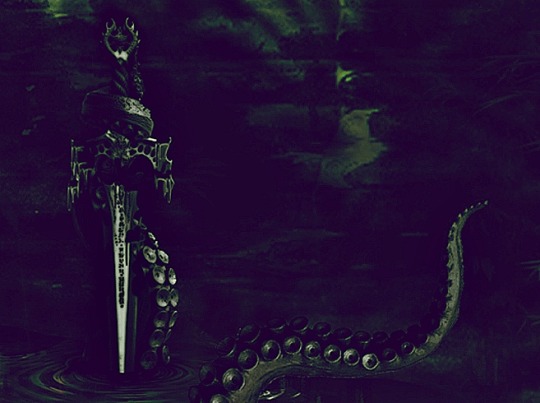
This is not an interpretive dance through Lovecraft's greatest hits, however. What Mad God have assembled is essentially a horror anthology, each of its six chapters bearing witness to some monstrosity -- real or imagined. All of them are unimaginably terrifying.
"The oldest and strongest emotion of mankind is fear, and the oldest and strongest kind of fear is
fear of the unknown." (H.P. Lovecraft)
The parade of deplorables kicks off in the cemetery, where apparently if there is no rest for the wicked, then neither will there be respite the just. "Haunting the Graves of the Unhallowed" is like a nod Unhallowed Graves and perhaps The Reluctant Dead by the pioneering author of African horror, Nuzo Onoh. Mad God bring a Goyaesque gravity to the song, with the witchy metallic grit of early Yob or the bitter-sweet ire of Trouble -- all caged with the expansive song structure made a staple of the genre by the godfathers of doom, Black Sabbath. That's for those of you reaching for a point of reference in this slow-burning, bubbling cauldron of toxic stew. It won't take long for you to acclimate to the flavor, and with repeated spins you'll be easily picking up on the Mad God distinctives.
If the first track draws upon the supernatural, "The DeZalze Horror" is grounded in grizzly physical reality. In January of 2015, the papers greeted South Africans with the strange story of a millionaire and his family massacred at the DeZalze Golf Estate golf resort outside of Cape Town. Henri van Breda, was the apparent lone survivor and claimed amnesia about the whole event. He evaded justice for a year-and-a-half, until all evidence in the investigation confirmed that the 20-year old Henri had indeed wielded an axe against his father, mother, brother, and sister (the latter being the sole survivor).
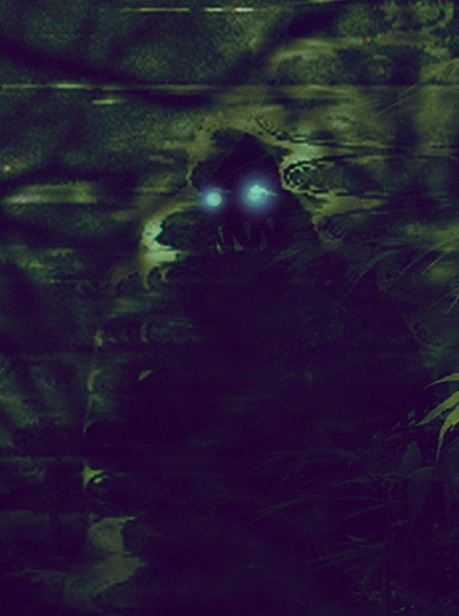
Mad God's mean, sludgy swagger makes this track a fitting bedfellow with Church of Misery's bevy of serial killers. Tim's guitar chugs along like someone pacing hallways, Evert and Patrick's rhythm section makes me think the bump and drag of the axe's head along the floor, while Henri laments the shocking outcome of his brutal rage. A bluesy, fuzzy interlude brings us the 911 call, and the drums pound like sunken heartbeat, resigned to the awfulness and permanence of one's decision.
Last month, the band chose "I Created God" as the album's first single. "This song was written after watching a Charles Manson documentary, following his death in 2017," Tim Harbour explains. Though Manson remains the perennial muse of songwriters, he hastens to add: "This song does not condone the actions of the cult leader, but rather delves into the psyche and motives of both him and his followers around the time of the murders that took place in 1969." As one might expect, the lyrics aren't pretty, underlying the band's thesis that despite the beauty and good in the world, the ugliness of evil is never far behind and is often three steps ahead. Unlike the notorious fascination of Uncle Acid & the deadbeats for Charlie, Mad God's musical characterization of Manson and his Helter Skelter scenario is somber, with his mad ramblings echoing through the song's final stretch.
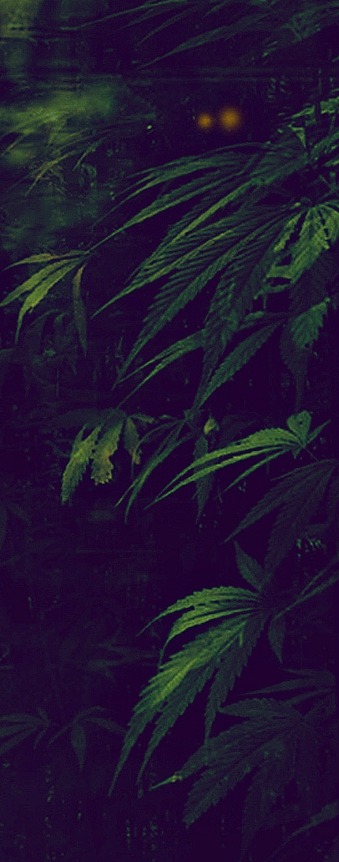
"The Crawling Chaos" follows, a reference to the short story written by Lovecraft, but based upon a dream of a companion, poet Winifred V. Jackson. A hazy, Alice in Wonderland ambience opens this opium fever dream, in which an accidental overdose leads to a misshapen landscape mired by 50 foot waves, outsized flora, and bizarre trip beyond the Milky Way. The song is perhaps emblematic of the horrors lying dormant within each of our mind, not to mention the subtext of addiction.
"No Prayers, No Fires" is my favorite of the lot, for it led me down another fascinating rabbit trail. This one took me all the way to one Herbert George Wells -- yes, the self-same H.G. -- who wrote a non-fiction book speculating about the future of society. Central to his book, 'The Future in America: A Search After Realities' (1906), a travelogue of impressions from his first visit to the States, was the Oneida Community of New York. Once hailed as a triumph of human cooperation and communal living, there were now "no prayers, no fires upon the deserted altars of Oneida any more forever..." Their leader, a cultic figure by the name of John Humphrey Noyes, wanted to bring about Christ's fabled millennial kingdom (which was all but an obsession of 19th century religionists), but the enterprise fell upon scandal and financial ruin. The evil groove of this song is key to its success and the band is in fine form for the duration.
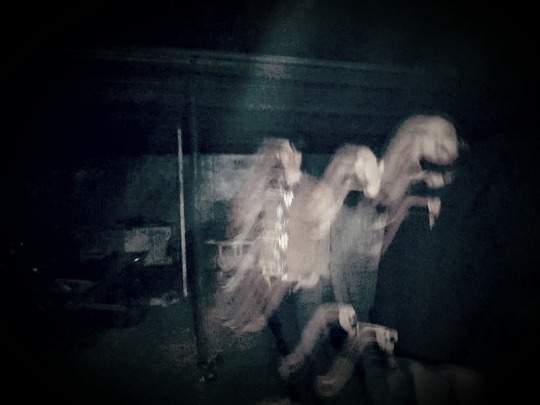
At last comes "Wild Hunt," which returns us to the spirit realm for a romp through the underworld, with faintly human apparitions fastened upon their ghostly steeds in pursuit some unknown prey. Legend has it that those among us unfortunate enough to see a vision of the Wild Hunt will be met with sure calamity. It's not a fast song, as we've become conditioned to by bands that tend to go nuts with the "wild" part. Mad God's take is, in fact a sad one -- more in the spirit of Reagers-era Saint Vitus or more recently, Pallbearer. These departed spirits are "bound by eternity" to chase after desires they could never be satisfied in their former lives, nor in this pale existence. It's a tasteful conclusion to the album, though it does leave one with a feeling of melancholy.
Mad God's Grotesque and Inexorable drops this weekend and can be pre-ordered here. Of all the surprises we've been treated to in 2018, this is perhaps the grimmest and most tantalizing -- not unlike a Lovecraftian monster.
Give ear...
Grotesque and Inexorable by Mad God
Some Buzz
'Grotesque and Inexorable' (2018) is the 2nd full length release by Johannesburg doom metal band, Mad God. Mad God was formed in 2014 by Tim Harbour, Tim Harrison and Patrick Stephansen with the intention of bringing doom metal to South Africa, as it is one of the most underrepresented metal genres in the country. 2015 saw Mad God release their first split, 'Unholy Rituals' alongside Johannesburg stoner act Goat Throne. The following years were good for doom metal, the Temple of Doom shows put on in Joburg became a regular event for stoner, psychedelic and doom metal music showcasing some of South Africa’s best talent such as Ruff Majik, STRAGE, Corax, Pollinator, The Makeovers and many more.
In 2017, bassist Tim Harrison left the band and was replaced by Jarred Beaton and in July that year, Mad God released their first full length album titled 'Tales of a Sightless City,' which gained a fair amount of traction among online stoner and doom circles such as Stoned Meadow of Doom and MrDoom666 on YouTube as well as receiving favourable reviews from popular review sites such as Angry Metal Guy and Doombringer. That same year, Mad God did their first tour to Cape Town and staged a show with The League of Doom (Cape Town’s very own doom and stoner event organisers) as well as played at Krank’d Up Festival alongside acts such as Vulvodinya, OHGOD, Intervals, and Memphis May Fire. Shortly after, the tour the band took a hiatus to focus on writing new material and bassist Jarred Beaton was replaced by Pollinators lead singer and guitarist, Evert Snyman.
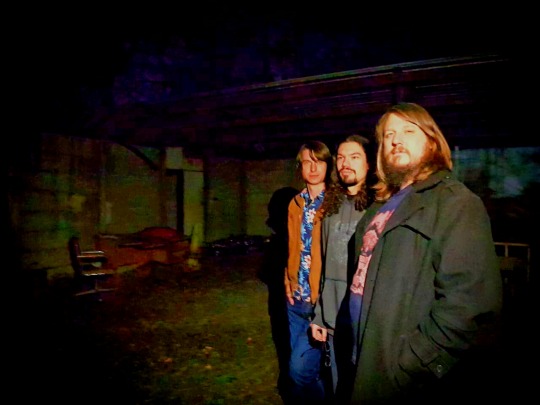
'Grotesque and Inexorable' is an exploration into new musical territory for Mad God. After the release of 'Tales of a Sightless City,' Mad God have been aiming to evolve their sound to something darker and more unique.
This album draws on much gloomier themes and the lyrics reflect this turn. The music itself is both dirtier and more progressive and as a band we tried to introduce a wider variety of influences including death and black metal as well as more traditional and heavy metal sounds, even including some '70s progressive rock.
The album title also reflects this change in sound. In other words, "disgusting and cannot be stopped." The band adds, "As Lovecraftian fan boys we had to throw the word grotesque in somewhere!"
Follow The Band
Get Their Music
#D&S Debuts#Mad God#Johannesburg#South Africa#Doom#Sludge#Metal#Doom Metal#D&S Interviews#Doomed & Stoned
7 notes
·
View notes